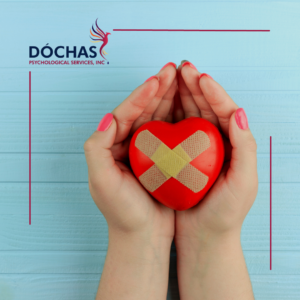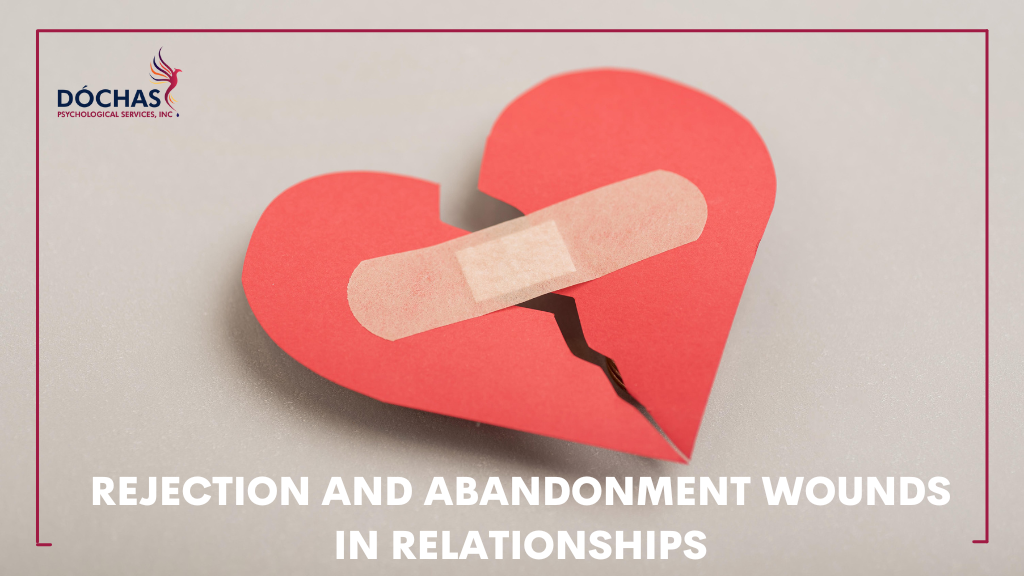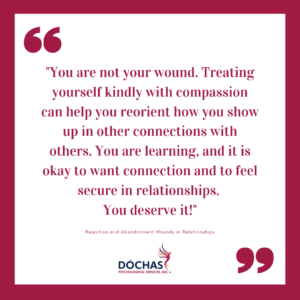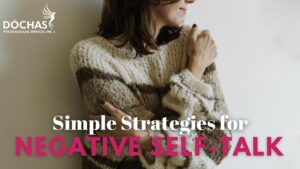Do you find yourself having trouble connecting in relationships? Is past trauma and rejection weighing you down? Hey, it’s Pooja here on the Dóchas Blog, and I want to talk to you about the types of abandonment and rejection wounds in relationships and how you can start your healing journey. First, relational connections to others are important! We are wired for connection. Relationships can be tricky to navigate if we have past experiences of a type of wounding from them. Some of us may carry specific wounds into our relationships. They can be protective but can also create further hurt to us.

Types of Wounding
I think two main types of wounding can show up in an individual who wants to connect with others: abandonment and rejection. They may sound similar, but they are slightly different. Abandonment in relationships is when another person ceases support or care in some way. There could be no particular reason for this. Rejection in relationships happens when we have revealed parts of ourselves to others, and that part has been dismissed, or we have been perceived as not meeting a type of standard in some way.
The wounds may feel more sensitive and prevalent in our intimate/romantic partnerships with others, but not exclusively in romantic partnerships. We may have experienced this several times in different relationships. One type of wounding may take precedence; however, I consider that it is possible for both wounds to show up in a person especially if we have experienced relational betrayal, traumas and hurts.
Let’s consider how these wounds may show up:
The Abandonment Wound. When experiencing this wound, a person may:
- Feel overwhelmed with emotions and bodily sensations, openly express not feeling okay in some way and have difficulty regulating their nervous system.
- They may appear to protest or feel like they cannot handle times when distancing or disconnection occurs. This could result in interpersonal conflicts with others.
- They may find it difficult to be in their own company.
- They may pursue connections with others.
- People with the abandonment wound may be labelled as being too clingy, when in fact they are working really hard to feel connected to others.
The Rejection Wound. When experiencing this wound, a person may:
- Feel emotionally overwhelmed to the point where their nervous system shuts down, resulting in an inability to express what is happening internally, and experiencing difficulty regulating their nervous system.
- They may withdraw from others or situations in order to feel safe and protect themself and their relationships with those who they care about. This may look like avoidance.
- They may not want to talk when sharing space with others or prefer their own space.
- May appear defensive and lash out when perceiving criticism or judgment.
- People with the rejection wound may be labelled as aloof, distant, not emotionally tuned in, and sensitive to criticism. In fact, they are working really hard to feel accepted by others.
Moving Forward: The Healing Journey
It is my opinion that these abandonment and rejection wounds in relationships need to be cared for in some way. Here are my go-to’s that can serve as a start on this healing journey:
Connect with body
The key here can be understanding our nervous system. Once we can find ways to support it, it can help us support our emotions, appraise situations, develop new meanings and communicate with others. This can be done through therapy but is not limited to it. The following activities which can support our nervous system are:
- Restorative activities to ground the body. This can include yoga, meditation, massage, nutrition, and personal care.
- Energizing activities to activate the body. This can include running, gym workouts, DIY projects etc.
Connect with self
You are not your wound. Treating yourself kindly with compassion can help you reorient how you show up in connections with others. You are learning, and it is okay to want connection and to feel secure in relationships. You deserve it! It is okay to take time to study yourself and reflect on catching moments where your wounds may show up.
Connect with others
If you need tools to connect with others, forming a therapeutic relationship with a psychologist or counsellor can be the first step to addressing the wound. Healing this can take time and may not be linear. However, it can serve as the bedrock for creating a safe and emotionally intimate connection with another person. Healing relational wounds doesn’t often occur outside of relationships. It can be risky to put ourselves in situations that may re-wound us and hurt us. However, without risk, there is no reward. I feel like that is one of the bravest things a human can do: to trust ourselves to be open with others in a secure and meaningful way after we have been emotionally wounded.
I hope this helps you understand abandonment and rejection wounds in relationships. If you would like to explore these wounds and learn tools to connect with others then I encourage you to reach out and ask us how we can help. You can reach out to us here by calling us at 780 446 0300 or emailing info@dochaspsychologicalservices.com.
About Dóchas Psychological
Dóchas Psychological Services is a well-established and trusted therapy clinic located in Spruce Grove, Alberta. At Dóchas we value the idea that everyone deserves a safe space. Through connection and education, our team works hard to build a trustworthy relationship with each of our clients. It is our goal to create a community for our clients to feel like they belong.
Disclaimer
Information provided through Dóchas Psychological Services blogs or vlogs is meant for educational purposes only. They are NOT medical or mental health advice. You can read more about our disclaimer here.










